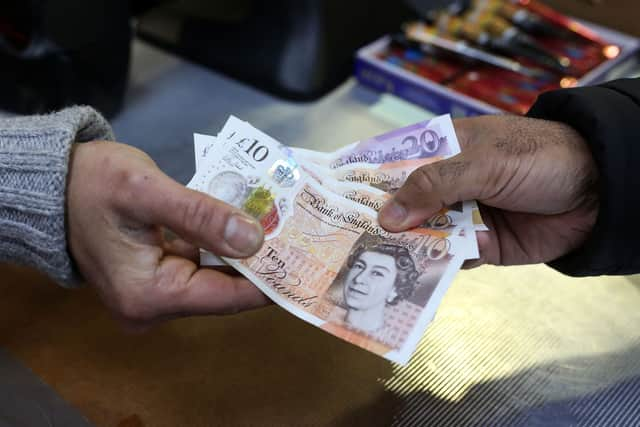Cost of living payments are ‘ineffective sticking plaster’, warns Institute of Fiscal Studies
and live on Freeview channel 276
Raising the value of benefits would have been preferable to sending lump sum cost of living payments to households, according to a leading UK economics thinktank which has dubbed the sporadic cash boost an “ineffective sticking plaster”. The Institute for Fiscal Studies (IFS) said the payments were “expensive” and “ineffective” and may spark problems later on.
The Government introduced the series of payments in order to help vulnerable households cope with shocks to their income from surging costs. The largest boost is five instalments totalling £1,550 for households on means-tested benefits and there are additional payments available for people who claim disability benefits along with pensioners.
Advertisement
Hide AdAdvertisement
Hide AdThe IFS said that the total cost of the payments is almost £19bn over two years - funds which experts argue should have been used to simply increase benefit rates. The report, funded by the Joseph Rowntree Foundation (JRF), indicated that the occasional nature of the payments may also spark additional problems.
The document said: “Benefits are uprated each April using a lagged measure of inflation from the previous September. This leads to temporary, but large, falls in the real value of benefits when inflation is rising quickly.”
Looking at an instalment of the payments in July 2022, researchers pointed out that a payment of £326 that month appeared to boost spending, indicating that people may have been experiencing hardship while they waited for the payment to arrive. The IFS also argued that large one-off payments, rather than smaller regular payments, are less useful when it comes to long-term budgeting.
Sam Ray-Chaudhuri, a research economist at the IFS and an author of the report, said: “The cost-of-living payments supported low-income households’ spending in the face of rising prices, and no doubt have helped alleviate significant deprivation. But, by giving the same amount to all households on benefits regardless of their circumstances, the payments were not targeted at those in the greatest need, limiting their effectiveness in poverty reduction.


Advertisement
Hide AdAdvertisement
Hide Ad“The government spent £8.3bn on lump-sum payments in 2022-23 and will spend an estimated £10.5 bn in 2023-24 – a better-targeted policy could have offered higher amounts of support to those in greatest need, with no additional cost to the taxpayer.”
A Government spokesperson said: “Our cost-of-living payments are delivering quick and much-needed support directly into the pockets of millions of low-income households, with extra help for pensioners and disabled people. We’re also helping the most vulnerable by increasing benefits in line with inflation while our changes to universal credit mean people keep more of their hard-earned money.”
Who is eligible for the cost of living payment?
You may be entitled to the payments if you get any of the following benefits or tax credits on certain dates:
- income-based Jobseeker’s Allowance (JSA)
- income-related Employment and Support Allowance (ESA)
- Income Support
- Pension Credit
- Universal Credit
- Child Tax Credit
- Working Tax Credit
The payment is made separately from benefit payments.
When are the cost of living payments paid?
- £301 was paid between 25 April 2023 and 17 May 2023 for most people on DWP benefits
- £301 was paid between 2 and 9 May 2023 for most people on tax credits and no other low income benefits
- £300 will be paid during autumn 2023 for most people
- £299 will be paid during spring 2024 for most people
Comment Guidelines
National World encourages reader discussion on our stories. User feedback, insights and back-and-forth exchanges add a rich layer of context to reporting. Please review our Community Guidelines before commenting.
